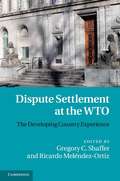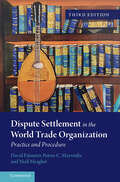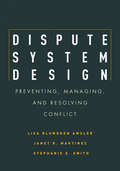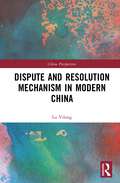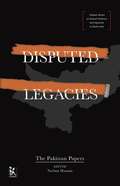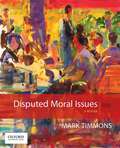- Table View
- List View
Dispute Settlement Reports 2017: Volume 3, Pages 1065 to 1586 (World Trade Organization Dispute Settlement Reports)
by World Trade OrganizationThe Dispute Settlement Reports are the WTO authorized and paginated reports in English. They are an essential addition to the library of all practicing and academic trade lawyers and needed by students worldwide taking courses in international economic or trade law. DSR 2017: Volume 3 reports on European Union - Measures Affecting Tariff Concessions on Certain Poultry Meat Products (WT/DS492) and United States - Certain Methodologies and their Application to Anti-Dumping Proceedings Involving China (WT/DS471).
Dispute Settlement Reports 2017: Volume 4, Pages 1587 to 2196 (World Trade Organization Dispute Settlement Reports)
by World Trade OrganizationThe Dispute Settlement Reports are the WTO authorized and paginated reports in English. They are an essential addition to the library of all practicing and academic trade lawyers and needed by students worldwide taking courses in international economic or trade law. DSR 2017: Volume 4 reports on United States - Certain Methodologies and their Application to Anti-Dumping Proceedings Involving China (WT/DS471) and China - Anti-Dumping Measures on Imports of Cellulose Pulp from Canada (WT/DS483).
Dispute Settlement Reports 2017: Volume 5, Pages 2197 to 2610 (World Trade Organization Dispute Settlement Reports)
by World Trade OrganizationThe Dispute Settlement Reports are the WTO authorized and paginated reports in English. They are an essential addition to the library of all practicing and academic trade lawyers and needed by students worldwide taking courses in international economic or trade law. DSR 2017: Volume 5 reports on United States - Conditional Tax Incentives for Large Civil Aircraft (WT/DS487).
Dispute Settlement Reports 2017: Volume 6, Pages 2611 to 3034 (World Trade Organization Dispute Settlement Reports)
by World Trade OrganizationThe Dispute Settlement Reports are the WTO authorized and paginated reports in English. They are an essential addition to the library of all practicing and academic trade lawyers and needed by students worldwide taking courses in international economic or trade law. DSR 2017: Volume 6 reports on European Union - Anti-Dumping Measures on Imports of Certain Fatty Alcohols from Indonesia (WT/DS442).
Dispute Settlement Reports 2017: Volume 8, Pages 3767 to 4372 (World Trade Organization Dispute Settlement Reports)
by World Trade OrganizationThe Dispute Settlement Reports are the WTO authorized and paginated reports in English. They are an essential addition to the library of all practicing and academic trade lawyers and needed by students worldwide taking courses in international economic or trade law. DSR 2017: Volume 8 reports on Indonesia - Measures Concerning the Importation of Chicken Meat and Chicken Products (WT/DS484), United States - Measures Concerning the Importation, Marketing and Sale of Tuna and Tuna Products (WT/DS381/ARB) and United States - Anti-Dumping and Countervailing Measures on Large Residential Washers from Korea (WT/DS464/RPT).
Dispute Settlement Reports 2018: Volume 1, Pages 1 to 602 (World Trade Organization Dispute Settlement Reports)
by World Trade OrganizationThe Dispute Settlement Reports are the WTO authorized and paginated reports in English. They are an essential addition to the library of all practicing and academic trade lawyers and needed by students worldwide taking courses in international economic or trade law. DSR 2018: Volume 1 reports on United States - Anti-Dumping Measures on Certain Oil Country Tubular Goods from Korea (WT/DS488) and United States – Anti-Dumping and Countervailing Measures on Certain Coated Paper from Indonesia (WT/DS491).
Dispute Settlement Reports 2018: Volume 10, Pages 5247 to 5864 (World Trade Organization Dispute Settlement Reports)
by World Trade OrganizationThe Dispute Settlement Reports are the WTO authorized and paginated reports in English. They are an essential addition to the library of all practicing and academic trade lawyers and needed by students worldwide taking courses in international economic or trade law. DSR 2018: Volume 10 reports on Australia - Certain Measures Concerning Trademarks, Geographical Indications and Other Plain Packaging Requirements Applicable to Tobacco Products and Packaging (WT/DS435, WT/DS441, WT/DS458, WT/DS467) and United States - Certain Methodologies and their Application to Anti-Dumping Proceedings Involving China - Arbitration under Article 21.3(c) of the DSU (WT/DS471).
Dispute Settlement Reports 2018: Volume 2, Pages 603 to 1164 (World Trade Organization Dispute Settlement Reports)
by World Trade OrganizationThe Dispute Settlement Reports are the WTO authorized and paginated reports in English. They are an essential addition to the library of all practicing and academic trade lawyers and needed by students worldwide taking courses in international economic or trade law. DSR 2018: Volume 2 reports on European Union - Anti-Dumping Measures on Biodiesel from Indonesia (WT/DS480) and China - Anti-Dumping and Countervailing Duty Measures on Broiler Products from the United States - Recourse to Article 21.5 of the DSU by the United States (WT/DS427).
Dispute Settlement Reports 2018: Volume 3, Pages 1165 to 1612 (World Trade Organization Dispute Settlement Reports)
by World Trade OrganizationThe Dispute Settlement Reports are the WTO authorized and paginated reports in English. They are an essential addition to the library of all practicing and academic trade lawyers and needed by students worldwide taking courses in international economic or trade law. DSR 2018: Volume 3 reports on Russia - Anti-Dumping Duties on Light Commercial Vehicles from Germany and Italy (WT/DS479)
Dispute Settlement Reports 2018: Volume 4, Pages 1613 to 1982 (World Trade Organization Dispute Settlement Reports)
by World Trade OrganizationThe Dispute Settlement Reports are the WTO authorized and paginated reports in English. They are an essential addition to the library of all practicing and academic trade lawyers and needed by students worldwide taking courses in international economic or trade law. DSR 2018: Volume 4 reports on European Union - Countervailing Measures on Certain Polyethylene Terephthalate from Pakistan (WT/DS486).
Dispute Settlement Reports 2018: Volume 5, Pages 1983 to 2516 (World Trade Organization Dispute Settlement Reports)
by World Trade OrganizationThe Dispute Settlement Reports are the WTO authorized and paginated reports in English. They are an essential addition to the library of all practicing and academic trade lawyers and needed by students worldwide taking courses in international economic or trade law. DSR 2018: Volume 5 reports on European Communities and Certain Member States - Measures Affecting Trade in Large Civil Aircraft - Recourse to Article 21.5 of the DSU by the United States (WT/DS316).
Dispute Settlement Reports 2018: Volume 6, Pages 2517 to 3390 (World Trade Organization Dispute Settlement Reports)
by World Trade OrganizationThe Dispute Settlement Reports are the WTO authorized and paginated reports in English. They are an essential addition to the library of all practicing and academic trade lawyers and needed by students worldwide taking courses in international economic or trade law. DSR 2018: Volume 6 reports on European Communities and Certain Member States - Measures Affecting Trade in Large Civil Aircraft - Recourse to Article 21.5 of the DSU by the United States (WT/DS316).
Dispute Settlement Reports 2018: Volume 7, Pages 3391 and 3922 (World Trade Organization Dispute Settlement Reports)
by World Trade OrganizationThe Dispute Settlement Reports are the WTO authorized and paginated reports in English. They are an essential addition to the library of all practicing and academic trade lawyers and needed by students worldwide taking courses in international economic or trade law. DSR 2018: Volume 7 reports on European Communities and Certain Member States - Measures Affecting Trade in Large Civil Aircraft - Recourse to Article 21.5 of the DSU by the United States (WT/DS316) and Indonesia - Safeguard on Certain Iron or Steel Products (WT/DS490, WT/DS496).
Dispute Settlement Reports 2018: Volume 8, Pages 3923 and 4796 (World Trade Organization Dispute Settlement Reports)
by World Trade OrganizationThe Dispute Settlement Reports are the WTO authorized and paginated reports in English. They are an essential addition to the library of all practicing and academic trade lawyers and needed by students worldwide taking courses in international economic or trade law. DSR 2018: Volume 8 reports on Australia - Certain Measures Concerning Trademarks, Geographical Indications and Other Plain Packaging Requirements Applicable to Tobacco Products and Packaging (WT/DS435, WT/DS441, WT/DS458, WT/DS467).
Dispute Settlement Reports 2018: Volume 9, Pages 4797 to 5246 (World Trade Organization Dispute Settlement Reports)
by World Trade OrganizationThe Dispute Settlement Reports are the WTO authorized and paginated reports in English. They are an essential addition to the library of all practicing and academic trade lawyers and needed by students worldwide taking courses in international economic or trade law. DSR 2018: Volume 9 reports on Australia - Certain Measures Concerning Trademarks, Geographical Indications and Other Plain Packaging Requirements Applicable to Tobacco Products and Packaging (WT/DS435, WT/DS441, WT/DS458, WT/DS467).
Dispute Settlement Reports 2020 Dispute Settlement Reports 2020: Volume 5, Pages 2039 to 2398 (World Trade Organization Dispute Settlement Reports)
by World Trade OrganizationThe Dispute Settlement Reports are the WTO authorized and paginated reports in English. They are an essential addition to the library of all practising and academic trade lawyers and a valued resource for students worldwide taking courses in international economic or trade law. DSR 2019: Volume 5 provides the reports on "Ukraine – Anti-Dumping Measures on Ammonium Nitrate (WT/DS493)" and on "United States – Measures Affecting Trade in Large Civil Aircraft (Second Complaint) (WT/DS353)".
Dispute Settlement Reports 2020: Volume 4, Pages 1523 to 2038 (World Trade Organization Dispute Settlement Reports)
by World Trade OrganizationThe Dispute Settlement Reports are the WTO authorized and paginated reports in English. They are an essential addition to the library of all practising and academic trade lawyers and a valued resource for students worldwide taking courses in international economic or trade law. DSR 2020: Volume 4 provides the reports on 'Australia – Certain Measures Concerning Trademarks, Geographical Indications and Other Plain Packaging Requirements Applicable to Tobacco Products and Packaging (WT/DS435, WT/DS441)'.
Dispute Settlement Reports 2021: Volume 1, 1-401 (World Trade Organization Dispute Settlement Reports)
by World Trade OrganizationThe Dispute Settlement Reports are the WTO authorized and paginated reports in English. They are an essential addition to the library of all practising and academic trade lawyers and a valued resource for students worldwide taking courses in international economic or trade law. DSR 2021: Volume 1 reports on United States - Anti-Dumping and Countervailing Duties on Ripe Olives from Spain (WT/DS577).
Dispute Settlement at the WTO
by Ricardo Meléndez-Ortiz Gregory C. ShafferThis examination of the law in action of WTO dispute settlement takes a developing-country perspective. Providing a bottom-up assessment of the challenges, experiences and strategies of individual developing countries, it assesses what these countries have done and can do to build the capacity to deploy and shape the WTO legal system, as well as the daunting challenges that they face. Chapters address developing countries of varying size and wealth, including China, India, Brazil, Argentina, Thailand, South Africa, Egypt, Kenya and Bangladesh. Building from empirical work by leading academics and practitioners, this book provides a much needed understanding of how the WTO dispute settlement system actually operates behind the scenes for developing countries.
Dispute Settlement in the World Trade Organization: Practice and Procedure
by Petros C. Mavroidis David Palmeter Niall MeagherThe WTO dispute settlement process has evolved in recent years into one of the most successful, yet complex, systems of international arbitration. In this extensively revised new edition of Palmeter, Mavroidis, and Meagher's authoritative book on WTO dispute settlement, the authors provide a comprehensive overview of each step of the WTO dispute settlement process, examining both the history of the system, the governing legal rules, and the more informal procedural aspects of the process in detail. This edition takes into account the jurisprudence of panels and the Appellate Body up to the end of 2020 and includes an analysis of the current crisis in the WTO Appellate Body. This volume is an essential tool for practitioners, diplomats, government lawyers, and students of WTO law and should equally be of interest to students of other forms of international arbitration.
Dispute System Design: Preventing, Managing, and Resolving Conflict
by Lisa Blomgren Amsler Janet Martinez Stephanie E. SmithDispute System Design walks readers through the art of successfully designing a system for preventing, managing, and resolving conflicts and legally-framed disputes. Drawing on decades of expertise as instructors and consultants, the authors show how dispute systems design can be used within all types of organizations, including business firms, nonprofit organizations, and international and transnational bodies. This book has two parts: the first teaches readers the foundations of Dispute System Design (DSD), describing bedrock concepts, and case chapters exploring DSD across a range of experiences, including public and community justice, conflict within and beyond organizations, international and comparative systems, and multi-jurisdictional and complex systems. This book is intended for anyone who is interested in the theory or practice of DSD, who uses or wants to understand mediation, arbitration, court trial, or other dispute resolution processes, or who designs or improves existing processes and systems.
Dispute and Resolution Mechanism in Modern China (China Perspectives)
by Lu YilongAs the second volume of a two-volume set on dispute resolution in modern China, this book presents an in-depth analysis of various disputes in modern China, exploring different experiences of dispute resolution and their implications.Through a series of case studies ranging from civil disputes, land-related conflicts, rural transportation accidents, and inter-ethnic social contradictions, this volume offers a nuanced examination of dispute resolution in contemporary China. Each chapter presents specific scenarios, ranging from family conflicts to civil disputes to farmers' contradictions with the government. The author employs various theoretical frameworks, including alienation theory and the risk society perspective, to analyze these disputes and their resolutions. The book highlights the importance of using diverse resolution methods beyond the legal approach, the unintended consequences of legal intervention, and the need to build safety valves in multi-ethnic areas to maintain social harmony.This title will appeal to scholars, students, and policymakers in the fields of law, sociology, and Chinese studies, especially those interested in understanding the intersection of law and society, social change, and governance in modern China.
Dispute and Risk Preventing in Modern China (China Perspectives)
by Lu YilongThe first of a two-volume set on dispute resolution in China, this book explores the landscape of disputes and risks in modern China, analyzing dispute resolution mechanisms and social impacts.Drawing on extensive social survey data, the author examines different types of disputes that occur in both rural and urban China. This volume summarizes 20 types of disputes in rural China, including their incidence and resolution, while also examining social contradictions and disputes in urban areas. Through theoretical frameworks such as dispute pyramid theory, law mobilization theory, and legality theory, the book provides deep insights into the complexities of conflict resolution in a rapidly changing society. Importantly, it emphasizes the importance of co-governance in conflict resolution and the development of risk control mechanisms for building a harmonious society.This title will appeal to scholars, students, and policymakers in the fields of law, sociology, and Chinese studies, especially those interested in understanding the intersection of law and society, social change, and governance in modern China.
Disputed Legacies: The Pakistan Papers (Zubaan Series On Sexual Violence And Impunity In South Asia Ser.)
by Neelam HussainThe Sexual Violence and Impunity in South Asia research project (coordinated by Zubaan and supported by the International Development Research Centre) brings together, for the first time in the region, a vast body of knowledge on this important - yet silenced - subject. Six country volumes (one each on Bangladesh, Nepal, Pakistan, Sri Lanka, and two on India) comprising over fifty research papers and two book-length studies detail the histories of sexual violence and look at the systemic, institutional, societal, individual and community structures that work together to perpetuate impunity for perpetrators. Disputed Legacies focuses on Pakistan, examining law, pedagogy, medical practice and the situations that arise when 'secular' law comes into conflict with traditional practice and belief. The contributors to this volume trace the often-troubled interaction between the state and its women citizens and examine the structures and social systems that enable impunity for perpetrators of sexual violence to gain strength.
Disputed Moral Issues
by Mark TimmonsThe guiding aim of this anthology is to connect various disputed moral issues with moral theory in order to help students better understand the nature of these disputes. The issues featured in this book include questions about the morality of various forms of sexual behavior; pornography, hate speech, and censorship; drugs and addiction; sexism, racism, and reparations; immigration; euthanasia and physician-assisted suicide; the ethical treatment of animals; abortion; cloning and genetic enhancement; the death penalty; war, terrorism, and torture; world hunger and poverty; and ethical questions that relate to consumption, climate change, and the environment in general.

